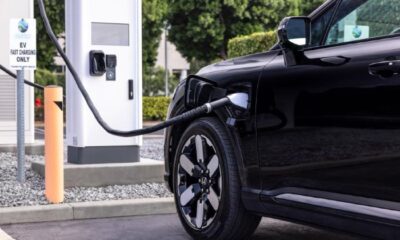Auto
Volvo Cars Switches to Renewable Fuels for Ocean Freight That Will Cut Fossil CO2 Emissions by 84%

Every year tens of thousands of containers of production material destined for Volvo Cars factories are carried across the world’s oceans on container ships. From now on, most of these seafaring journeys are made with renewable fuel instead of traditional fossil fuel.
As the first global car maker to announce such a switch, we’ll achieve an immediate reduction in fossil CO2 emissions from intercontinental ocean freight by 55,000 tonnes over a year. Thanks to the renewable fuel, CO2 emissions are reduced by at least 84 per cent1 compared to fossil fuel. The reduction is equivalent to the CO2 emissions of a full truck driving around the equator about 1,200 times.
The fuel used is Fatty Acid Methyl Esters (FAME) and is based on renewable and sustainable sources, mainly waste cooking oil. No feedstock related to palm oil or palm oil production is used.
We will use renewable fuel for inbound ocean container transports of production material destined for manufacturing plants based in Europe and the Americas, as well as all spare parts distribution made globally by ocean container transports.
“Renewable fuel is not the end game for removing CO2 from the world’s ocean freight needs,” says Javier Varela, our Chief Operating Officer and Deputy CEO. “Yet this initiative shows that we can act now and implement solutions that achieve significant results during the wait for long-term technological alternatives.”
“We don’t view this initiative as a competitive advantage,” Javier adds. “On the contrary, we want to spark other car makers into action as well, to increase demand for carbon efficient ocean transports and to establish renewable fuels as a mid-term solution that works. We all have a responsibility to act.”
We have been working on this initiative together with our logistics partners Maersk, Kuehne+Nagel and DB Schenker. These logistics service providers have from 1 June 2023 switched to renewable fuel for equivalent energy needed for all container transports done for Volvo Cars.
When renewable fuel is not available on a specific shipment, our renewable fuel allocation is instead used by the logistics partner for another customer’s route elsewhere, so the overall cut in fossil fuel use is kept on par with actual use in container vessels. The methodology, called mass-balancing, is third-party audited regularly. The renewable fuel itself is certified and not produced in competition with food crops. It is therefore sustainable in accordance with the EU Renewable Energy Directive.
“We’re continually exploring sustainability opportunities across all aspects of our supply chain, and across our overall business,” Javier Varela says. “Our list of initiatives keeps growing as we work towards our ambition of becoming a climate neutral company by 2040.”
Our ambition is to reduce our lifecycle carbon footprint per car by 40 per cent between 2018 and 2025, which requires a 25 per cent reduction in operational emissions, including logistics. We’re also aiming for climate-neutral manufacturing by 2025. Both these milestones are important steps toward our climate neutral ambitions.
1Comparison of fuels include emissions from production and use of the equivalent amount of energy, so called Well-to-Wake (WTW).
Volvo Cars in 2022
For the full year 2022, Volvo Car Group recorded an operating profit of SEK 22.3 billion. Revenue in 2022 amounted to SEK 330.1 billion, while global sales reached 615,121 cars.
About Volvo Car Group
Volvo Cars was founded in 1927. Today, it is one of the most well-known and respected car brands in the world with sales to customers in more than 100 countries. Volvo Cars is listed on the Nasdaq Stockholm exchange, where it is traded under the ticker “VOLCAR B”.
Volvo Cars aims to provide customers with the Freedom to Move in a personal, sustainable and safe way. This is reflected in its ambition to become a fully electric car maker by 2030 and in its commitment to an ongoing reduction of its carbon footprint, with the ambition to be a climate-neutral company by 2040.
As of December 2022, Volvo Cars employed approximately 43,200 full-time employees. Volvo Cars’ head office, product development, marketing and administration functions are mainly located in Gothenburg, Sweden. Volvo Cars’ production plants are located in Gothenburg, Ghent (Belgium), South Carolina (US), Chengdu, Daqing and Taizhou (China). The company also has R&D and design centres in Gothenburg, Camarillo (US) and Shanghai (China).
Source – Volvo Car
-

 Auto2 years ago
Auto2 years agoHonda Marine Debuts All-New BF350 Outboard Company’s First V8 Motor Available Commercially, Flagship Model Offers Premium Power and Unparalleled Performance for Extraordinary Boating Experiences
-

 Auto2 years ago
Auto2 years agoNew Features Further Increase Desirability Of Bentayga Range
-

 Technology2 years ago
Technology2 years agoOracle Partners with TELMEX-Triara to Become the Only Hyperscaler with Two Cloud Regions in Mexico
-

 Auto2 years ago
Auto2 years agoHonda and Acura Electric Vehicles Will Have Access to Largest EV Charging Networks in North America Aided by New Agreements with EVgo and Electrify America
-

 Lifestyle2 years ago
Lifestyle2 years ago2023 Nike World Basketball Festival Brings the Best of Basketball Style, Culture and Community














